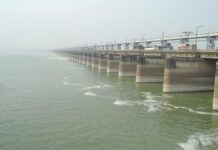Emergency teams on Friday kept up their search for the thousands still posted as missing from the tsunami-sized flash flood that swept the Libyan port city of Derna, killing at least 4,000 people.
The enormous surge of water burst two upstream dams late Sunday and reduced Derna to an apocalyptic wasteland where entire city blocks and untold numbers of people were washed into the Mediterranean.
An AFP photographer said central neighbourhoods on either side of the river, which normally dries up at this time of year, looked as if a steam roller had passed through, uprooting trees and buildings and hurling vehicles onto the port’s breakwaters.
“Within seconds the water level suddenly rose,” recounted one injured survivor who said he was swept away with his mother in the late-night ordeal before they both managed to scramble into an empty building downstream.
“The water was rising with us until we got to the fourth floor, the water was up to the second floor,” the unidentified man said from his hospital bed, in testimony published by the Benghazi Medical Center.
“We could hear screams. From the window, I saw cars and bodies being carried away by the water. It lasted an hour or an hour and a half — but for us, it felt like a year.”
Hundreds of body bags now line Derna’s mud-caked streets, awaiting mass burials, as traumatised and grieving residents search mangled buildings for missing loved ones and bulldozers clear streets of debris and mountains of sand.
In one shattered home, a rescue team pumped out the water to reveal a woman’s lifeless arms still clutching her dead child, an AFP correspondent reported.
“This disaster was violent and brutal,” said Yann Fridez, the head of the Libya delegation of the International Committee of the Red Cross, which had a team in Derna when the floodwaters hit.
“A wave seven metres (23 feet) high wiped out buildings and washed infrastructure into the sea. Now family members are missing, dead bodies are washing back up on shore and homes are destroyed.”
Abdelaziz Bousmya, who lives in the Chiha neighbourhood which was spared by the wall of water that devastated lower-lying districts, estimates that at least a tenth of the city’s population of 100,000 were killed.
“I lost my friends, my loved ones — they are all either buried under the mud or got swept out to sea by the floodwaters,” the 29-year-old said.






























